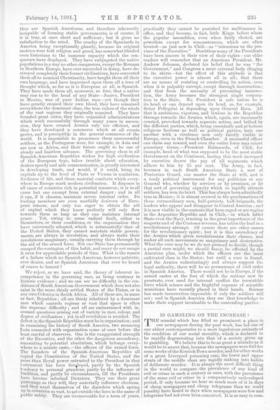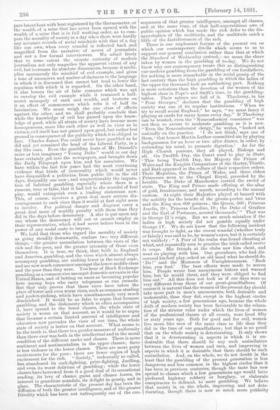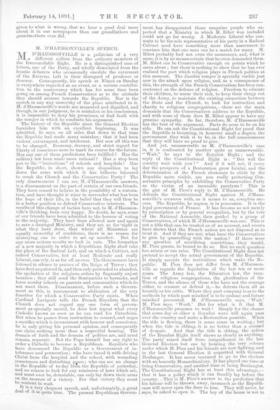IS GAMBLING ON THE INCREASE ? T HE scandal which has
filled so prominent a place in our newspapers during the past week, has led one of our ablest contemporaries to a most lugubrious estimate of the condition of our social morality, which is declared to be rapidly degenerating into that of a society given up to gambling. We believe this to be as groat a mistake as it would be to assert that, because the newspapers were full for some weeks of the Kentish Town murder, and for other weeks of a great Liverpool poisoning case, the lower and upper strata of the middle class are rapidly sinking into habits of deliberate murder. It is always the most difficult thing in the world to compare the prevalence of any kind of evil or crime in such a century as ours, with the prevalence of the same evil or crime in a comparatively undeveloped period, if only because we hear so much more of it in days of cheap newspapers and cheap telegrams than we could possibly have heard in days when newspapers were few and telegrams had not even been conceived. It is as easy to com- pare latent heat with heat registered by the thermometer, or the wealth of a mine that has never been opened with the wealth of a mine that is iu full working order, as to com- pare the morality of society in a day when there were hardly any accurate records of social mischiefs with that of a day like our own, when every scandal is reflected back and magnified from the narrative of scores of journalists and not a few formal interviewers. We admit freely that to some extent the minute curiosity of modern journalism not only magnifies the apparent extent of any evil, but increases its absolute dimensions, because it multi- plies enormously the mischief of evil example, and gives a tone of unconcern and matter-of-factness to the language in which it is discussed that cannot but tend to lower the repulsion with which it is regarded. On the other hand, it also lowers the air of false romance which was apt to envelop the evil example while it remained a half- secret monopoly of rank and wealth, and bestows on it an effect of commonness which robs it of half its fascination. We must weigh the one class of effects against the other, and we shall probably conclude that while the knowledge of evil has gained upon the know- ledge of good, while all strata of society have become more homogeneous, more like each other as well in vices as in virtues, evil itself has not gained upon good, but rather lost ground in consequence of the publicity which it is obliged to face. Charles James Fox could never have gambled as he did and yet remained the head of the Liberal Party, in a day like ours. Even the gambling feats of Mr. Disraeli's more or less imaginary " Young Duke " would in our day have certainly got into the newspapers, and brought down the Daily Telegraph upon him and his associates. We have within the last few years had the most convincing evidence that kinds of immorality which would never have disqualified a politician from public life in the old days, disqualify one now ; and unquestionably the imputa- tion of habitual gambling, especially where there is a rumour, true or false, that it had led to the scandal of foul play, would extinguish even a leading statesman now. This, of course, involves a great deal more serious dis- couragement to such vices than it would at first sight seem to involve. For political danger and disgrace carry a great deal more of worldly penalty with them than they did in the days before democracy. A slur is put upon any one whom the democracy will not or cannot employ as their representative, which it had never before been in the power of any social caste to impose. We hold that those who regard the morality of society as going steadily downwards, confuse two very different things,—the greater assimilation between the vices of the rich and the poor, and the greater intensity of those vices themselves. It is true, we think, that both in England and America, gambling, and the vices which almost always accompany gambling, are sinking lower in the social scale, and are now much commoner amongst the lower-middle class and the poor than they were. You hear of Stock Exchange gambling as a common vice amongst domestic servants in the United States, and of betting on races as becoming popular here among boys who carry telegrams or run errands. But that only proves that these vices have taken the place of lower and even worse vices, such as common stealing and pocket-picking, which have simultaneously very much diminished. It would be as false to argue that because gambling, and the dishonesty which so often accompanies it, have spread to the lower classes, the whole state of society is worse on that account, as it would be to argue that because a certain limited amount of intelligence and education now pervades the vices of our time, the whole state of society is better on that account. What seems to be the truth is, that there is a greater measure of uniformity than there ever was both in the intellectual and in the moral condition of the different ranks and classes. There is more sentiment and sentimentalism in the upper classes ; there is less violence in the lower classes. There are more petty excitements for the poor ; there are fewer orgies of high excitement for the rich. " Society," technically so called, has abandoned its cock-fighting, prize-fighting, duelling, and even its worst delirium of gambling ; while the lower classes have borrowed from it a good deal of its sensational reading, its love of chance gains and chance losses, its interest in grandiose scandals, its delight in gossip, and in glare. The characteristic of the present day has been the diffusion of both the greater intelligence, and of the greater frivolity which has been not unfrequently one of the con- sequences of that greater intelligence, amongst all classes, and at the same time, of that half-superstitious awe of public opinion which has made the rich defer to the dis- approbation of the multitude, and the multitude catch a little of the fastidiousness of the rich.
There is one unpleasant feature of the present era on which our contemporary dwells which seems to us to support our general conclusion rather than that at which the Standard of Wednesday arrived,—we mean the share taken by women in the gambling of to-day. We do not know why our contemporary treats this as distinguishing our modern gambling from the gambling of our forefathers, for nothing is more remarkable in the social gossip of the last century than the high gambling in which the ladies of the upper ten thousand took an unblushing part. Nothing is more notorious than the devotion of the women of the highest class in Pope's and Swift's time, to the gambling- tables. Their satires are full of it. Thackeray, in his " Four Georges," declares that the gambling of high society was one of its regular institutions. " When we try to recall social England," he says, " we must fancy it playing at cards for many hours every day." If Thackeray can be trusted, even the " Nonconformist conscience " was not then so averse to moderate gambling as it is now. "Even the Nonconformist clergy,'. he writes, "looked not unkindly on the practice. I do not think,' says one of them, that honest Martin Luther committed sin by playing backgammon for an hour or two after dinner, in order, by unbending his mind, to promote digestion.' As for the High Church parsons, they all played, Bishops and all. On Twelfth Day, the Court used to play in State. ' This being Twelfth Day, his Majesty the Prince of Wales and the Knights Companions of the Garter; Thistle, and Bath appeared in the collars of their respective orders. Their Majesties, the Prince of Wales, and three eldest Princesses went to the Chapel Royal, preceded by the heralds. The Duke of Manchester carried the sword of state. The King and Prince made offering at the altar of gold, frankincense, and myrrh, according to the annual custom. At night their Majesties played at hazard with the nobility for the benefit of the groom-porter, and 'twas said the King won 600 guineas ; the Queen, 360 ; Princess Amelia, 20 ; Princess Caroline, 10 ; the Duke of Grafton and the Earl of Portmore, several thousands.' " That was in George IL's reign. But we are much mistaken if the ladies in high society did not gamble equally under George IV. We do not know that the following incident was brought to light, as the recent scandal (whether truly or falsely) was said to be, by women's eyes, but it is certainly not unlikely : " A Peer of the realm was found cheating at whist, and repeatedly seen to practise the trick called muter la coupe. His friends at the clubs saw him cheat, and went on playing with him. One greenhorn, who had dis- covered his foul play, asked an old hand what he should do. ' Do !' said the Mammon of Unrighteousness. ' Back him, you fool.' The best efforts were made to screen him. People wrote him anonymous letters and warned him, but he would cheat, and they were obliged to find him out." All this does not look as if our days were so very different from those of our great-grandfathers. Of course it is natural that the women of the present day should take more part in men's amusements,•both desirable and undesirable, than they did, except in the highest circles of high society, a few generations ago, because the whole drift of modern society has been favourable to the relaxa- tion of the stricter rules under which the lives of women of the professional classes at all events, were lived fifty or sixty years ago. Both for good and for evil, women live more like men of the same class in life than they did in the time of our grandfathers ; but that is no proof that on the whole society is deteriorating. It only shows that it is deteriorating in aspects in which it is un- desirable that there should be any such assimilation between the lives of women and men, and improving in aspects in which it is desirable that there should be such assimilation. And, on the whole, we do not doubt in the least that the gambling of the present generation is less dangerous and less common in the highest circles than it has been in previous centuries, though the taste has now spread to classes which a few generations ago would have preferred highway robbery or burglary, or elaborate conspiracies to defraud, to mere gambling. We believe that society is, on the whole, improving, and not dete- riorating, though there is now so much more publicity given to what is wrong, that we hear a good deal more about it in our newspapers than our grandfathers and grandmothers ever did,




































 Previous page
Previous page